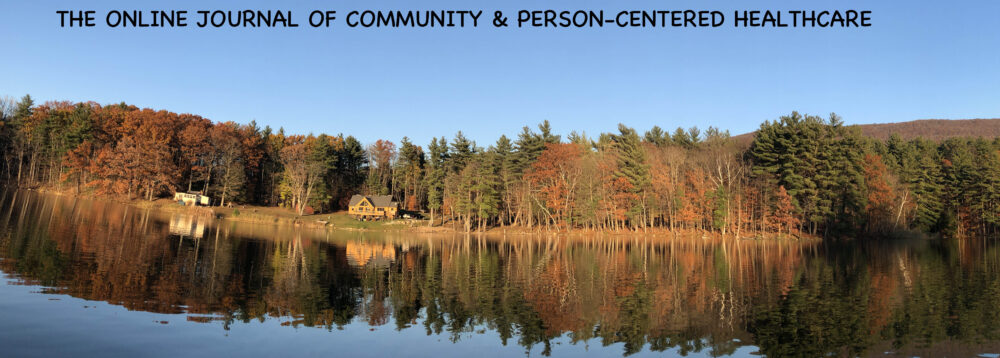by Caroline Neal, R.N.*
In 1983, I was 23 years old, a college graduate, and had worked as a registered nurse for a year. I moved with my new husband from Georgia to Cooperstown, New York where he began a medical internship. I accepted a job as a home health nurse with the Otsego County Public Health Department. Each day, I drove over 100 miles on back roads in central New York’s Appalachian Mountains visiting patients whose diagnoses and ages varied widely. Prior to this year, I had rarely traveled out of the South and had seen snow only a couple of times. Everything was different; everything was the same in this new place.

In March 1983, after Charles’s mom called and shared her endometrial cancer diagnosis, the phone rings again. Once more it is family calling with bad news. Dad is on the line and asks to speak to both of us. His call occurred when we were both home. We are never both home.
We tilt the phone in between our heads and hear his authoritative voice grow husky as he says, “I have bladder cancer. I want Caroline to come home. She’s the nurse. She’s the eldest daughter.”
I tell him that I am heartbroken but that I cannot come and recount the facts he knows– that I am an hourly worker with no vacation, and that I am the bread winner. Charles is in the thick of his internship.
Dad is silent.
Charles asks clinical questions, informs Dad of what he knows of the disease, a positive prognosis is probable, what his follow up will involve and asks permission to call his urologist. We look at each other, feeling the silent heat of Dad’s anger flowing through the telephone. He likes control. Illness is the opposite. He wants his family gathered at his bedside.
Dad says, “Okay, Charles, call my urologist. Caroline, you’ve hardened, you’re just like all medical workers. You’re already crass. I love you.”
The conversation ends quickly after my voice squeaks to a sob saying, “You’ve got to understand. You knew this was going to be a hard year. You know I would come if I could.”
My words and tears do not soften him, and we hang up with him mad and me sad. The word, “crass” burrows deep. His desire to have his family gather is not unusual for patients. I have navigated hospital rooms stuffed with family members. They fill the space trying to squeeze out the fear that death pursues their loved one. The remembrance of times when folks entered the hospital and did not leave alive or unharmed continues, causes people to rally to offer prayer as a means of protection from unseen forces. The general thought is the more people assembled to pray, the better the possibility of a complete recovery. Obligation is another motivator. These command performances are usual for a geographically close family. The gatherings resemble a picnic with food, blankets, laughter, and conversation in an odd setting of the hospital. Family members spill from the patient’s room over into waiting areas. I understand the culture, the expectation, but I cannot fulfill his wishes.
For days, I perform my tasks at the house, see my patients, cross stitch, knit, write letters, work at the co-op, and talk with Ernie Neal, my cat and occasionally Charles. Behind each of these activities, a marquee flashes in my mind with the word, CRASS. It embeds itself deeper. The more I obsess over the conversation the more I second guess myself.
At first, I huff to no one in particular, I know I will not confront Dad and stand up for myself.
In an imagined conversation I say, “Do you know what word, crass becomes if you drop the first two letters?”
I continue the unspoken argument like an attorney, citing evidence that being a nurse has not hardened me. Adamantly, I would proclaim that I am his daughter first, but I am also a nurse. I would confess the knowledge that I possess seems both a blessing and a curse.
Then I redact that comment, and say, “Nursing has changed me.”
My heart hurts. My brain is full of terrible images; sounds, and nightmares that disturb my sleep. I get whiffs of odors that no amount of scrubbing can rid my senses of. I pray to learn to compartmentalize and hope the patients blur into one assembly. I want to forget their names, their stories, and their families. I want not to ache all over from the physical exhaustion. I want a legal authority to issue a decree that I did the best I could for my patients and certify that I am not crass.
I make my opening argument. I have held babies that look like frogs, tied together with wires. I have fed people who lack their mandibles and tongues. I have held two fingers over a tracheotomy for seconds at a time so I can hear the words behind the weeping. I have shaved legs of a trauma comatose patient, my same age. I have collapsed into her mother’s arms when she blinked her eyes opened and said, “Momma.” I have run with a farmer’s mangled finger to the operating room where surgeons try to reattach and make it whole.
I shudder remembering patients’ last baths and preparations before transferring their bodies to storage in the morgue. The closing of their eyes, feeling the now still globes beneath my fingers. Removing dressings, IVs, other medical devices that we inserted in hopes that technology would outpace death. The tying of tags on the toe, on the wrist, the last nametags. The quiet talk with the person who assists me. The two of us, struggling to wiggle the dead weight into a plastic bag. Not able to breathe, fighting the feeling of suffocation as we enclose the body. Me, gulping for air, breathing for my dead patient and myself. Attaching the final identifying tag around the neck area. The bag looking like a faceless ghost. Lifting the heavy, lifeless bag onto a gurney. Wheeling the stretcher into the morgue with its refrigerated drawers. Opening a drawer. Releasing a retractable steel table that slides slowly out between my assistant and myself. Loading the filled bag onto the cold slab and returning it into its cavern. Shutting the file like a cabinet. Leaning, my back against the closed door. Pausing for two seconds, closing my eyes with fingers pressed into their corners. Returning to the floor to a full patient roster. Hearing my name called on the loudspeaker, summoning me. Smiling through the remainder of the shift.
*Caroline Neal grew up in Macon, Georgia and graduated with a BSN from The Medical College of Georgia in 1982. In January 2023, she obtained an MFA from Queens University in Charlotte, NC. This piece is an excerpt from her work-in-progress: “1983: Cooperstown & Me, A Young Nurse’s Memoir.” Alongside her 40 year nursing career, she also owns and runs a commercial timber business. Caroline splits her time between North Carolina and Hawaii. You may email her at: chnealATec.rr.com
